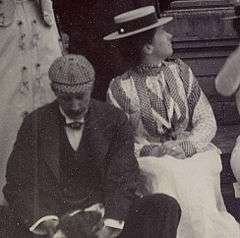Violet Markham
| Violet Rosa Markham | |
|---|---|
|
Charles Paxton Markham and his sister Violet Markham (1903)[1] | |
| Born | 1872 |
| Died | 1959 |
| Spouse(s) | Lieutenant-Colonel James Carruthers |
Violet Rosa Markham CH (October 1872 – 2 February 1959) was a writer, social reformer and administrator. She grew up near Chesterfield, the daughter of Charles Markham, part owner of the profitable Markham Collieries and Markham & Co.[2] Engineering of Chesterfield. When a friend of her late father died in 1901 Violet inherited enough money to live an independent life and devote her wealth to causes she supported, as well as to buy her own house in London. Her mother was a daughter of Sir Joseph Paxton, designer of the Crystal Palace, the centrepiece of the 1851 Great Exhibition.
Her first interest was education. She was a member of the Chesterfield Education Authority from 1899 to 1934, and in 1902, she was the founder President of the Chesterfield Settlement, an educational foundation for the local community which existed until 1958. Later she became involved in public service in different sectors. At the outbreak of World War I, she became a member of the Executive Committee of the National Relief Fund, established to alleviate distress caused by the war. The fund dispensed aid to service families and dependents, as well as civilians. The experience of this organisation left her with a lifelong interest in reducing the effects of poverty and unemployment, especially with regard to women. In 1914 she became a member and later chairman of the Central Committee of Women's Training and Employment, which in 25 years trained nearly 100,000 women, mainly for domestic service. In 1917 she was made deputy director of the women's section of the National Service Department, and was one of the first recipients of the Companionship of Honour. In 1920 she began a long period as a member of the Industrial Court, and became a member of the Lord Chancellor's Advisory Committee for Women Justices.
Violet Markham was also active politically. Mary Stocks considered Markham to be "the best feminist I've ever known, a real feminist".[3] Having been a vocal opponent of women's suffrage and a strong supporter of Women's National Anti-Suffrage League, she stood as an Independent Liberal for the Mansfield Division of Nottinghamshire in the 1918 general election. (The Coalition Government endorsement went to Jarrett);
| Party | Candidate | Votes | % | ± | |
|---|---|---|---|---|---|
| Labour | William Carter | 8,957 | 43.6 | ||
| National Democratic | George William Symonds Jarrett | 6,678 | 32.6 | ||
| Liberal | Mrs Violet Rosa Carruthers | 4,000 | 19.5 | ||
| Independent | Dr Nowroji M Tarachand | 878 | 4.3 | ||
| Majority | 2,279 | 11.0 | |||
| Turnout | 52.5 | ||||
| Labour gain from Liberal | Swing | ||||
She was elected as a town councillor for Chesterfield in 1924, and served as Mayor of Chesterfield in 1927.[2]
In 1934, she became a member of the Unemployment Assistance Board, becoming Deputy chairman in 1937 – 'probably the most important administrative post up to that time that had been held by a woman,' according to her obituary in The Times.[5] When the Second World War began, it was inevitable that her talents would be called on. She organised an all-night canteen for the poor of South London. She was on the appeal tribunal of the Defence of the Realm Regulations, and in 1942, she was asked to produce a report on allegations of immorality in the women's services. In 1945 she produced a report with Florence Hancock on the postwar organisation of domestic service.
She also travelled extensively abroad. Among her friends was the Canadian politician Mackenzie King, whom she met in 1905 and with whom she kept up an active correspondence for 45 years. King visited her when he was in England and she visited him on her occasional trips to Canada. She sent him money on a number of occasions, notably after his electoral defeat in 1911, and again to provide medical treatment for his brother who was suffering from tuberculosis. In 1923, the Canadian government appointed her to represent them on the governing body of the International Labour Organisation in Geneva.
In 1915, Violet Markham married Lieutenant-Colonel James Carruthers, but she continued to be known by her maiden name. She accompanied her husband to Cologne, when he was stationed there as chief demobilisation officer for the British Army of the Rhine, following the First World War. Her husband was subsequently a racehorse owner, who died suddenly at Ayr Racecourse in 1936. She wrote several books, including Paxton and the Batchelor Duke, a biography of her grandfather (1935), Return Passage (1953) and Friendship's Harvest (1956).
References
- ↑ Markham family photographs, accessed 22 August 2008
- 1 2 Violet Markham, British Library, accessed 23 August 2008
- ↑ Late Night Line-Up | The Suffragettes
- ↑ British Parliamentary Election Results 1918–1949, FWS Craig
- ↑ Obituary, The Times, 3 February 1959
- Helen Jones (Editor): Duty and Citizenship – The Correspondence and Papers of Violet Markham, 1896–1953 ISBN 1-872273-03-3
- Obituary, The Times, 3 February 1959.
External links
- "Archival material relating to Violet Markham". UK National Archives.
- Catalogue of the Markham papers at the Archives Division of the London School of Economics.
